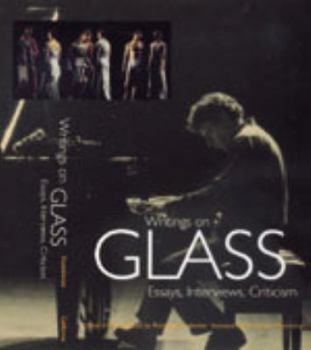Writings on Glass: Essays, Interviews, Criticism
Select Format
Select Condition 
Book Overview
Philip Glass, composer of symphonies, operas ( Einstein on the Beach, Akhnaten, Orphee ), film scores ( Kundun, Mishima, Koyaanisqatsi ), songs, and music for dance is a musician who determined early... This description may be from another edition of this product.
Format:Paperback
Language:English
ISBN:0520214919
ISBN13:9780520214910
Release Date:January 1999
Publisher:University of California Press
Length:376 Pages
Weight:1.05 lbs.
Dimensions:0.9" x 5.5" x 8.2"
Customer Reviews
1 rating
A good portrait of Glass' works and life
Published by Thriftbooks.com User , 18 years ago
A book on Glass' avant-garde minimalist compositional style surprised me as he nears his 70th birthday as a significant 20th century composer. Discovering Glass (b.1937) with "The Photographer (83)" CD some 15 years ago, Glass' self-titled website with a biography section does not do justice, especially during his formative years. Biographies show how one's developmental years translate into accomplishments as an adult and parent. The book is divided into 4 parts, Part I Metamorphosis, Part II Instrumental Music, Part III Music for Theatre and Film, and Part IV Endgame. The book is a compendium of published articles. Part III is the largest section consuming about 1/2 the book, with most articles authored in the mid 80s to early 90s. In this section is a 4 pg article by Robert C Morgan (famed art critic) on "The Photographer," 84 revised 96. There are about 30 articles in the book with an average length of 10 pages. Three of the articles have musical score (analysis by Wes York, "Akhnaten"), a diagram (String Quartet No1), and lyrics (Hydrogen Jukebox) to describe Glass' creative process. Part IV Endgame has a 1 pg bibliography, 11 pg listing of works by year for 3 decades, 7 pg discography, and 7 pg index. The book's printed ISBN is not current and the book is not listed on the publisher's website. The dust jacket has been rebadged ISBN 0-8256-7246-5, as the publisher's trade books was divested to musicsales dot com, London. My favorite part of this book is a 25-page interview by Ms Ev Grimes, PhD about Glass' musical education in Section I, p12-36, which has been further edited by the composer and the author. Ev Grimes is a nationally acclaimed producer of documentaries on musicians and cultural topics and she was a NPR radio commentator back in the 70s. The interview / documentary was commissioned by the Yale School of Music (Oral History American Music project). I found Glass's candid comments about his family, early flute teacher, inner city Baltimore high school, U Chicago and NYC's Juilliard quite interesting (covering 1940s-50s). The author claims that this is probably the most comprehensive interview of Glass growing up that exists and is a book exclusive. In p15-31, Philip, middle son of a Lithuanian immigrant Jew and skilled mechanic, dropped out of a southern Baltimore, Maryland high school, challenged by examination entrance requirements into U of Chicago at age 15 (1952-6) majoring in math and philosophy earned an AB. In the south Chicago neighborhood, extemporaneous Jazz music clubs exposed him to non-classical music. Applying to Juilliard at 19, he expanded his compositional skills. A well-rounded individual, he worked during summers as a crane operator for Bethlehem Steel near Baltimore to help pay tuition. Juilliard's tiny composition department at the time in 1957-62, was focused on experimental modern American music such as Copeland and Hindemith. So Glass got a lot of individual freedom to compose and expressed his talen






